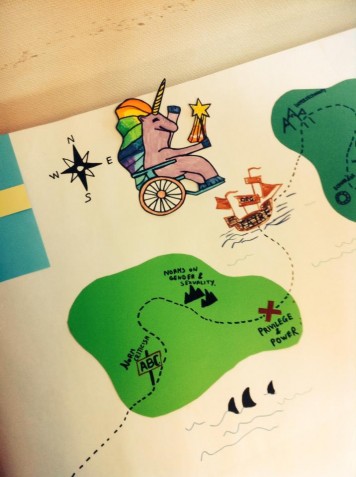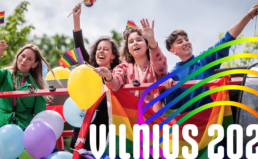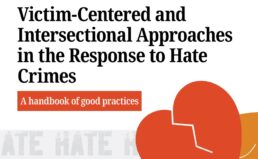From the 25th to the 30th of May, 2015, I had the opportunity to attend the Conference “Positive Steps Beyond Criticism”, organized by IGLYO and hosted by IGLYO’s Member Organisation RFSL Ungdom in Stockholm. Main goals of the conference were to explore the topic of norm criticism and to invite participants to explore and formulate ways to employ norm critical approaches in all aspects of their work. Participants were human rights and LGBT*activists from inside and outside the European Union, united by the interest to use more norm-critical and intersectional approaches in the mainstream of work of the organizations they were representing.
The whole conference was designed to have a better understanding of how coercive mechanisms and power structures fully influence societies in every country and to analyze the available tools to challenge the marginalization of minority groups within society.
On the arrival day in Stockholm, organizers and the prep-team of the conference welcomed participants at RFSL, where some welcoming and ice-breaking activities were organized in order to get to know each other. The following day, the conference effectively started and immediately focused on the main topics of the conference: participants were asked to position themselves on the learning continuum of concepts such as norm-criticism, privilege and intersectionality and to write down their reflections on flipcharts dedicated to the above-mentioned ideas. Some history and ABC of Norm-critical approaches were given to participants; it was of particular interest discover for instance how in Sweden much research and work was done to investigate more on norm-critical pedagogy. From this interest on the topic, norm criticism in Sweden became a course in some universities in the field of gender studies.
Participants had to brainstorm in small groups on the definition of “norm” and on which norms mainly affect individual’s behavior on daily basis. Some of the examples elaborated by participants included norms affecting private relationships, appearance and gender also inside the LGBT*-community. At the end of the session, each group reached similar conclusions, in particular on the fact that norms have often to do with expectations and impositions of models to adapt to. Plus, it was recognized that from norms often come respectability and access to resources according to the privileged groups inside society. In addition, a fact that emerged from every work-group, was that distinction between gender and sex is often blurred in many societies, thus causing the wrong assumption that someone’s gender defines also one’s sexual orientation and vice-versa.
One interesting activities on demolishing prejudice, was a scavenger hunt on magazines and newspapers of various identities and orientations (i.e. find an image of a bisexual woman, a transgender person, a black man, a dark-skinned woman, a white man in a high position). Each group experienced difficulties in carrying out the exercise since it was almost impossible not to fall into stereotypes and not to notice how norms were over represented in these kind of magazines. Therefore, I guess this was a first step towards a norm-critical approach to reality.
In the second session, norms on gender and sexuality were at the center of analysis. The aim was to understand how identities and perceptions are socially constructed, according to certain norms and to discuss and understand the basis of cis-norms and hetero-norms. Participants were asked to enlist six aspect of their identity and then to prioritize them. Another exercise concerned instead brainstorming on masculine and feminine characteristics. It emerged that many of the stereotypes arising were deeply connected with concepts such as patriarchal society, organized religion, mass media imagery, discourses, birth certificates, nation states, scientific community, laws…
 Next session focused instead on the concepts of privilege and power and how these operated. Participants were asked to analyze around which categories the idea of privilege spins around. Some words from the word cloud on privilege included ability, biology, social position, social capital, straight sexuality, body parts… Then participants were split in different groups and looked at the various different privileges related to concepts such as cis, male, white, able-bodied, heterosexual and socio-economic status. Participants were invited to undertake the Teflon Test, a questionnaire fostering reflections on which privileges we experience and on the other side, which parts of our identity and characteristics are exposed to harm and discrimination. It turned out that the majority of people were experiencing a mixture of positions, some marginalized while other privileged instead. Around the concept of privilege, the conference fostered reflections on the meaning of being an ally. Understanding your own privileges, does not indeed precludes opportunities of education and being able to stand up for support.
Next session focused instead on the concepts of privilege and power and how these operated. Participants were asked to analyze around which categories the idea of privilege spins around. Some words from the word cloud on privilege included ability, biology, social position, social capital, straight sexuality, body parts… Then participants were split in different groups and looked at the various different privileges related to concepts such as cis, male, white, able-bodied, heterosexual and socio-economic status. Participants were invited to undertake the Teflon Test, a questionnaire fostering reflections on which privileges we experience and on the other side, which parts of our identity and characteristics are exposed to harm and discrimination. It turned out that the majority of people were experiencing a mixture of positions, some marginalized while other privileged instead. Around the concept of privilege, the conference fostered reflections on the meaning of being an ally. Understanding your own privileges, does not indeed precludes opportunities of education and being able to stand up for support.
Two special lectures were given by experts as a demonstration on how norms and advertisements go often hand in hand in enforcing stigma and prejudices. The first lecture “Norm criticism and HIV Prevention” focused on norm critical approaches to HIV prevention, i.e. by challenging stigmatizing images and embracing on the contrary sex positive messages and images. If knowing one’s HIV status is crucial, changing the picture of how HIV is presented is fundamental to decrease the stigma pending on HIV-positive persons.
In the second lecture, an expert from “Cavaria” (Belgium) shared the best practices of the organization in norm-critical approaches towards advertisements enforcing gender stereotypes. Cavaria started only few years ago to work in schools on challenging gender stereotypes. The idea was to establish workshops for teachers that could make teachers thinking more critically on how norms related to gender highly impact children’s education. Cavaria’s trainings brought eventually an interesting conclusion: it resulted that schools who are gender stereotype aware have better performing students, which of course represents a result that any school would like to achieve. The session concludes with some scenarios exercises assigned to small groups in order to norm-critically evaluate the messages that some advertisements suggest.
The third day of the conference focused on the (desirable) link between norm-criticism and intersectionality. The objectives included using norm criticism as a tool to understand how all forms of oppression are interconnected, since they are perpetrated by the same power control structures. Consequently, a norm-critical and intersectional approach should be adopted both inside the mainstream of work of LGBT*-rights organisations and outside. In addition, activists had the chance to attend extra workshops organized on request of the participants to the conference. Among these, one on “inclusive language” was organized with the idea to highlight norms trough language and at the same time to attempt to use a more inclusive language despite many of participants’ native languages happen to be consistently gendered.
The following session focused instead on the good practices applied to regional realities. The goal was to understand different realities according to different regions and thus to share the everyday experiences faced by participants’organizations in adopting a norm-critical approach. The second session of the day focused on IGLYO’s future goal of implementing a “Norm Criticism Toolkit”, useful for organizations and schools. Participants were divided in small groups where ideas were shared on the best strategies to delineate chapters on glossary, example exercises and workshops, case studies and good practices, safe spaces and events checklist and, of course, norms to address.
In the last session, participants acquired basic skills on action planning and designed a plan for a small scale intervention to implement norm critical approaches to their work or to introduce new learning opportunities in their countries for norm criticism. Drawing a plan was a small step, but an important moment to assess one’s own process in having a norm-critical approach in the mainstream of the organizational work and outside that.
The session finished and participants challenged the norms and at the same time had some fun, b participanting at a very sparkling and glamour drag party hosted at the centre of RFSL.
Some final reflections:
To conclude, did the conference focus on the blinded and inflexible challenge and opposition to norms, no matter what? No, that is not the point, at least in my opinion.
What we need to keep in mind is that when we challenge norms, we create on our turn other norms: these might benefit us but also leave other people out. By this, I mean to stress the fact that norm-critical approaches are different by norm-abolishing ones. Indeed, norms are not per se bad things and actually some norms are good ones: I am personally quite happy about not living in a Hobbesian world where anybody has the right to kill the other. The problem however starts when by establishing some norms, the rights to self-determination of other people becomes undermined. As activist, what becomes important is to bear these concept in mind and keep a norm-critical mindset in the mainstream of work, by challenging those norms that interfere with the positive expression of each own individuality. And then? Then, unite a norm-critical approach to your work with an intersectional approach. Why? Because norms are inevitably related to each other: addressing only one norm at one time will not get rid of the intertwined power relation that the specifically addressed norm has in many other fields. There is need to look at the greatest picture and not to the single pixel of the picture.
Article written by EVS volunteer Alice Michelini
© Photo courtesy of IGLYO
LGL is carrying out the 10 month project “Promoting Human Rights Activism in Lithuania” under the Erasmus+ programme EVS (European Voluntary Service).





